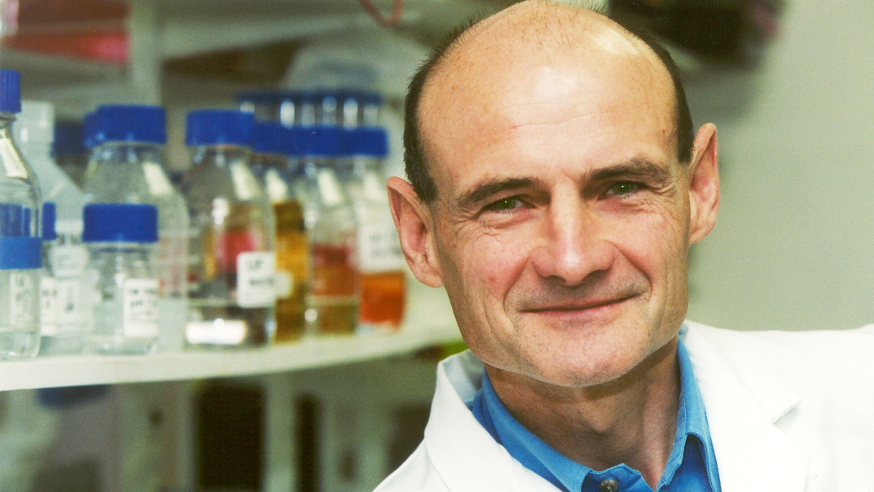
Professor Chris Marshall FRS, who passed away in 2015.
Walking through the park in the glorious sunshine last week, I was looking forward to a day of hearing about the amazing achievements of one of our greatest scientists – the late Professor Chris Marshall.
Entering the welcoming cool of The Royal Society, I was greeted with a buzz of excitement as Professor Marshall’s friends, colleagues, peers and mentees gathered to showcase his outstanding cancer research.
Professor Marshall was Director of Research here at The Institute of Cancer Research, London, and established an international scientific reputation during his 35 years at the ICR.
He was interested in the complex signalling networks within cells, and the various ways in which they get rewired during the development of cancer. One of his greatest achievements, for instance, was to discover the NRAS oncogene, and to figure out how oncogenic Ras proteins drive cancer cell proliferation. So I was interested to find out more about how his research has influenced those he worked with, and more about his colourful personality.
A trailblazer in cancer research
Professor Peter Rigby, former Chief Executive of the ICR, opened the ‘On Chris Marshall’s Wheel’ symposium. He explained that Professor Marshall was an avid cyclist, and if you wanted to be somewhere in a cycle race, it was on the wheel of the person in front. Professor Marshall was a trailblazer in cancer research, and many scientists have benefited by conducting their own careers in the slipstream he created.
Some of these scientists spoke at the symposium, and paid tribute to a brilliant colleague who had had such an influence on their own research. I’ve picked out a few of the many interesting talks at the event.
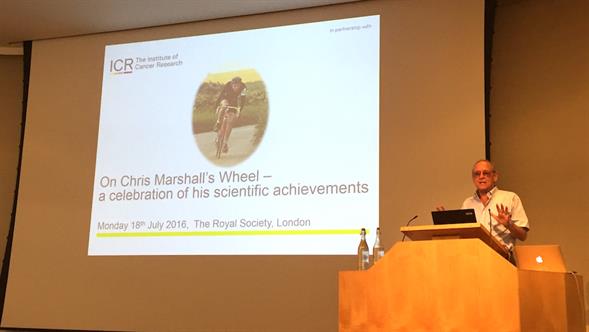
Professor Peter Rigby speaks at the event.
Will Ras ever be a drug target?
The first session was chaired by Professor Robin Weiss, former Director of the ICR, who met Chris in 1974 whilst working at Lincoln’s Inn Fields. He introduced the first speaker, Professor Frank McCormick who is working to develop therapies against Ras-driven cancers at the University of California, San Francisco.
These cancers include most pancreatic cancers, and many colorectal and lung cancers, and are amongst the most difficult cancers to treat. He explained that the KRas protein is mutated in 30% of cancers, making it an attractive drug target. And yet it still remains elusive, mainly because researchers still lack detailed information about what the surface of the protein looks like as it moves and interacts with other proteins that modify its activity.
As the scientific community has become frustrated at this lack of knowledge, so efforts to discover drugs to target Ras have dwindled. But Professor McCormick said research to target Ras was very much alive. He is carrying out an extensive research programme which is looking at multiple ways to attack Ras, including focusing on the Ras alleles that cause human cancer – mainly G12C, G12D and G12V.
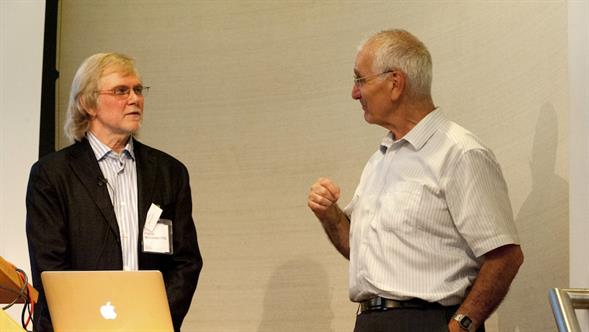
Professors Frank McCormick (left) and Robin Weiss (right).
New ways to target skin cancer
Professor Jon Pines, chaired the next session, which concluded with a talk from Professor Richard Marais, who told us that his first conversation about Ras with Professor Marshall took place under a tree at an oncology meeting in 1994.
Professor Marais is now Director of the Cancer Research UK Manchester Institute. His work has contributed to significant advances in our understanding of the causes of skin cancer and the development of important new personalised treatments, including the BRAF inhibitor verumafenib.
Working closely with Professor Caroline Springer at the ICR, they have created a new generation of drugs called pan-RAF inhibitors that target both BRAF and CRAF, and which aim to combat the resistance seen with verumafenib.
Professor Marais also talked about analysing the miniscule amounts of tumour DNA in the bloodstream, so researchers can gather information on how the tumour is behaving. Ideally doctors could switch the patient on a different therapy as soon as new mutations are detected, even before any clinical signs are apparent.
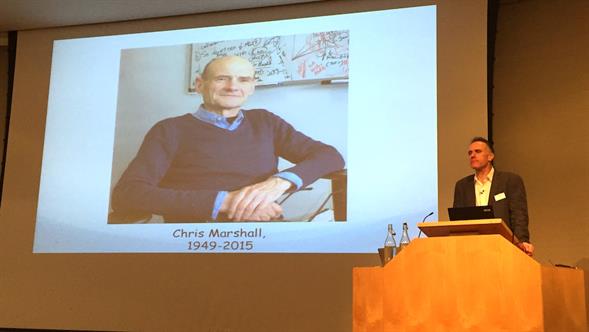
Professor Richard Marais, Director of the Cancer Research UK Manchester Institute, presents at the symposium.
Professor Marshall’s enduring influence
The third session was chaired by Professor Clare Isacke who introduced Professor Karen Vousden – Professor Marshall’s first postdoc. She said Professor Marshall had taught her how to do science, and how to love science, and she has gone on to become a leading expert on the p53 gene which is commonly mutated in cancer.
We also learnt from Professor Alan Ashworth – another former ICR Chief Executive – about the intense drug discovery efforts that surround the breast cancer genes BRCA1 and BRCA2.
ICR scientists including Professor Ashworth discovered the BRCA2 gene, and their work has resulted in significant improvements in care for people with BRCA mutations, both through gene testing and the development of new drugs such as olaparib. Professor Ashworth worked closely with Professor Marshall, and said he had never met anyone who was so fantastically rigorous at science.
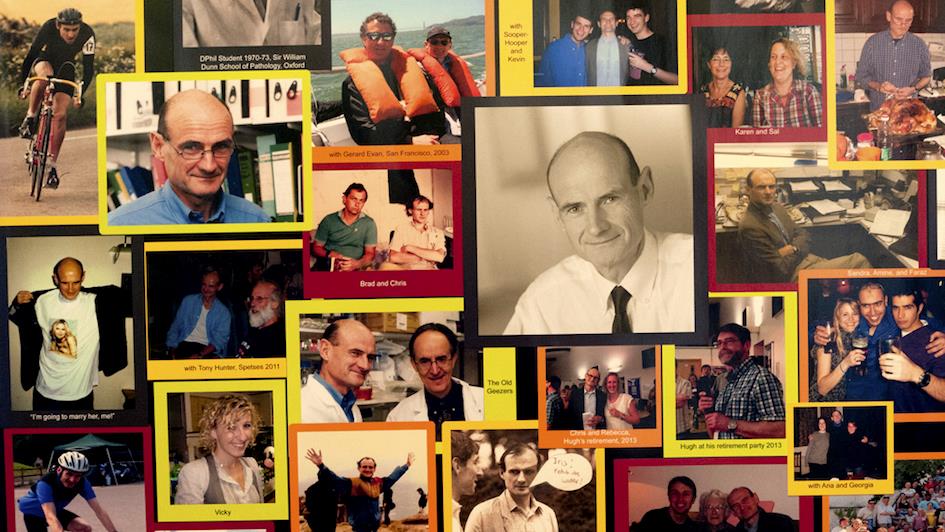
A photo montage in tribute to the life of Professor Chris Marshall
Professor Marshall’s legacy
Chief Executive Professor Paul Workman provided concluding remarks, and stated that Professor Marshall was the most outstanding scientist he has worked with in his career.
With seven or eight classes of drug already stemming from work carried out by Professor Marshall, he leaves a wonderful legacy for patients.
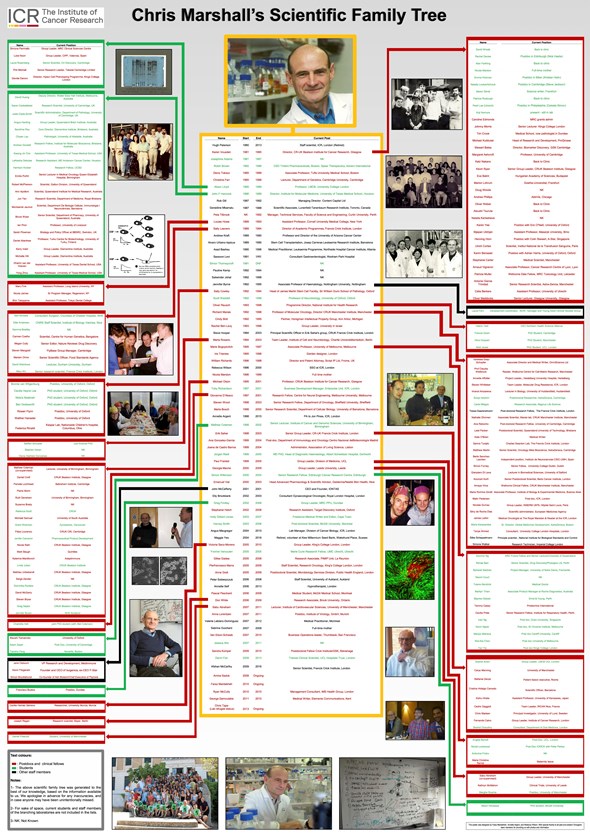
Professor Chris Marshall’s scientific family tree, illustrating the careers of scientists that worked with Chris. Tree created by Annette Argent, Rebecca Wilson and Faraz Khosravi Mardakheh. Click to view full-size image (7.6 MB).
comments powered by